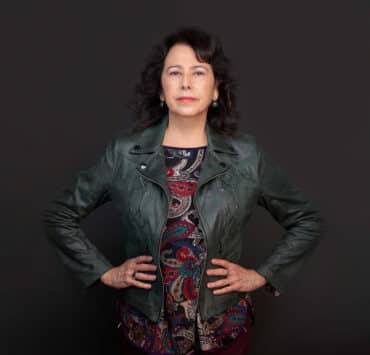|
Getting your Trinity Audio player ready...
|
Camila Victoriano has always embraced her Peruvian and Chilean heritage.
“I was born and raised in Miami, Florida, a very unapologetically Latino city. I was really fortunate to grow up in a community where I saw myself all the time,” Victoriano says. “Once I left Miami to go to college, it was a very different experience.”
While studying English literature at Harvard, Victoriano realized how special Miami is. Ever since, she has looked for opportunities to reconnect with and serve the Latinx community in Miami and beyond. In 2020, she took this endeavor to the next level by cofounding Sonoro, a media company as unapologetically Latinx as the city she grew up in. The company quickly found an audience for its content, which seeks to break new ground through its storytelling while empowering creators and listeners alike.
Victoriano’s first job out of college was at the Los Angeles Times. As a member of the business development team, she focused on identifying avenues through which the legacy media organization could increase its digital media footprint. “I was exploring food platforms, event series, documentaries—things like that,” the cofounder says. “And in that exploration, I came upon audio and podcasting as this great medium to naturally extend journalism into.”
“What I hope for our community of creators is for them finally to get their due. We’re helping them bring their stories to life, first in audio and hopefully then in TV and film.”
Camila Victoriano
Victoriano had a chance to test those waters in 2017, when she contributed to the launch of Dirty John, a hit podcast subsequently adapted for television. She then turned her attention to the Times audio division, which functioned as an embedded startup. Her experience building out that division paved the way for her to strike out on her own a few years later, with fellow Sonoro cofounders Joshua Weinstein and Gerónimo Ávila.
More than the general allure of an entrepreneurial venture, Victoriano saw in Sonoro a chance to have a tangible impact on the Latinx community in the US and globally—and on the media and entertainment industry at large. “Sonoro’s vision is to reinvent what it means to be a media company,” she explains. “Everything that we are creating and producing starts in audio, which allows us to quickly and efficiently test out ideas and experiment with new types of stories and characters. The other huge piece of it, of course, is the focus on the Latino community. For us, that means everything we create is made by Latinos.”
Victoriano points out that the Latinx community has often been framed as a niche market, despite the community’s significant size and rate of consumption. The Sonoro team, itself entirely Latinx and bicultural, caters to and empowers this very group of people that has been historically underserved by the so-called mainstream media.
In the beginning, Sonoro focused on Latin American creators and audiences, producing most of its content in Spanish. Victoriano, who serves as the company’s head of partnerships, highlights the fiction podcast Toxicomanía: El Experimento Mexicano as an early Spanish-language success.
“It was based on the true story of a Mexican doctor in the 1940s who worked with the president at the time to legalize all drugs in the country for six months,” she elaborates. “From a mission standpoint, it was such an incredible story because it flips the script of the typical media narrative around Latinos—and in particular, Mexicans—and drugs completely on its head.”
The podcast topped Mexico’s fiction charts and climbed to the US’s number two spot, speaking to the show’s broad audience appeal and resonance. Sonoro’s more recent English-language programming has been similarly well-received. For instance, its series Tejana—starring Latina actor Stephanie Beatriz as a Texas Ranger and released in partnership with Spanish-language television network Telemundo (Tejana was only produced in English)—won Best Fiction Podcast at the 2022 Ambie Awards.
For Victoriano, Tejana and Toxicomanía exemplify how Sonoro strives to reach different types of Latinx audiences, whether they speak Spanish, English, or both. “In the Latino community around the world and especially in the US, many of those in younger generations—myself included—speak English as their first or only language,” she says. “So it’s really important for us to continue to produce shows both in English and in Spanish, sometimes at the same time.”
In the months and years to come, Sonoro will be doing exactly that. “Here in the US, we’ll be launching a lot more series in English or in English and Spanish, which I think will be a critical next phase for us in our growth,” Victoriano says. “We built the number-one independent podcast network in Latin America, and this year is really about extending that success into the US and around the globe.”
“In the Latino community around the world and especially in the US, many of those in younger generations—myself included—speak English as their first or only language. So it’s really important for us to continue to produce shows both in English and in Spanish, sometimes at the same time.”
Camila Victoriano
With a slate of exciting partnerships and shows on the horizon, Victoriano is eager for Sonoro’s listeners and creators to experience all that is in store, as the company continues to live up to its promise of Latinx empowerment and industry change.
“What I hope for our community of creators is for them finally to get their due. We’re helping them bring their stories to life, first in audio and hopefully then in TV and film,” Victoriano says. “A big part of our mission when we started out was to be the partner of choice, whether for media companies, podcasters, talent, or creators. We want to be the home where all of those folks feel that their creativity is being taken seriously, and we want them to feel that Sonoro is the best facilitator to reach a global Latino audience.”

